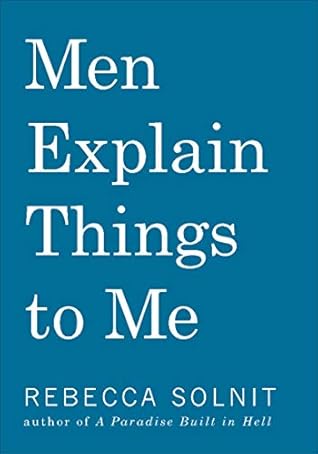More on this book
Community
Kindle Notes & Highlights
But explaining men still assume I am, in some sort of obscene impregnation metaphor, an empty vessel to be filled with their wisdom and knowledge.
Most women fight wars on two fronts, one for whatever the putative topic is and one simply for the right to speak, to have ideas, to be acknowledged to be in possession of facts and truths, to have value, to be a human being.
Violence doesn’t have a race, a class, a religion, or a nationality, but it does have a gender.
violence is first of all authoritarian. It begins with this premise: I have the right to control you.
That assault is part of the great class war of our era, in which the rich and their proxies in government have endeavored to aggrandize their holdings at the expense of the rest of us. Poor countries in the developing world paid first, but the rest of us are paying now, as those policies and the suffering they impose come home to roost via right-wing economics that savages unions, education systems, the environment, and programs for the poor, disabled, and elderly in the name of privatization, free markets, and tax cuts.
Marriage equality is a threat: to inequality. It’s a boon to everyone who values and benefits from equality. It’s for all of us.
Motherhood and respectability became the armor, the costume, in which these women assaulted in one case the generals and in the other, a nuclear weapons program and war itself. The role was a screen behind which they had a limited kind of freedom of movement in a system in which no one was truly free.
We know less when we erroneously think we know than when we recognize that we don’t. Sometimes I think these pretenses at authoritative knowledge are failures of language: the language of bold assertion is simpler, less taxing, than the language of nuance and ambiguity and speculation.
Despair is a form of certainty, certainty that the future will be a lot like the present or will decline from it; despair is a confident memory of the future, in Gonzalez’s resonant phrase. Optimism is similarly confident about what will happen. Both are grounds for not acting.
The implication that women as a category are unreliable and that false rape charges are the real issue is used to silence individual women and to avoid discussing sexual violence, and to make out men as the principal victims. The framework is reminiscent of that attached to voter fraud, a crime so rare in the United States that it appears to have had no significant impact on election outcomes in a very long time. Nevertheless, claims by conservatives that such fraud is widespread have in recent years been used to disenfranchise the kinds of people—poor, non-white, students—likely to vote
...more
Language is power. When you turn “torture” into “enhanced interrogation,” or murdered children into “collateral damage,” you break the power of language to convey meaning, to make us see, feel, and care. But it works both ways. You can use the power of words to bury meaning or to excavate it. If you lack words for a phenomenon, an emotion, a situation, you can’t talk about it, which means that you can’t come together to address it, let alone change it.
Rape culture affects every woman. Most women and girls limit their behavior because of the existence of rape. Most women and girls live in fear of rape. Men, in general, do not. That’s how rape functions as a powerful means by which the whole female population is held in a subordinate position to the whole male population, even though many men don’t rape, and many women are never victims of rape.
Like racism, misogyny can never be adequately addressed by its victims alone. The men who get it also understand that feminism is not a scheme to deprive men but a campaign to liberate us all. There’s more that we need to be liberated from: maybe a system that prizes competition and ruthlessness and short-term thinking and rugged individualism, a system that serves environmental destruction and limitless consumption so well—that arrangement you can call capitalism.


